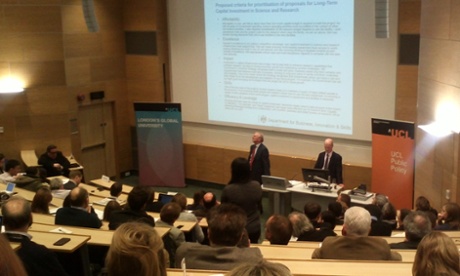
A capital investment of £5.8 billion in science and research over the next five years is quite a lot of money, even on the scale of, for example, HS2 (£17 billion) or replacing Trident (about £20 billion, without running costs). Comparing it to some "recurrent" (as opposed to capital) spending, it is nearly a quarter of the total UK government expenditure on science (the non-capital bit is "ring-fenced" at £4.7 billion per year), 1.1% of the total government spend on education, and 0.15% of total government spend on everything. It's £18.40 per year per person in the UK. I've been to two talks this week featuring a consultation the government just launched on how to spend the money.
You might have seen a few decisions announced as to how some of the money will be spent. Neutrons, telescopes, space missions and a ship, for example. Without grumping at all about any of those, a frequent criticism of capital spending decisions is that they can appear arbitrary and unplanned. I have sat in advisory board meetings where, after hours spent sharing a few hundred thousand pounds around to keep some great science staggering along, tens of millions suddenly appear, and must be spent immediately, on something different. It can feel like a starving person in a desert being suddenly given a ton of raw pork to eat, and no fridge or cooker. Actually it is sometimes like a starving person being given a huge flat-screen TV and a bill for the electricity.
So it is great the government are not only planning to invest this money but are planning to invest it. And even better that they are consulting before making that plan.
The two talks were aimed at academics and researchers. The first was at UCL, by the Minister for Universities and Science, David Willetts. The second was at the Institute of Physics and was a double-header by John Womersley and Andrew Bourne, representing the two research councils (STFC and EPSRC) most involved in funding physics. After the first talk, Stephen Curry asked whether and how the public would be involved in the consultation. I asked pretty much the same question at the second talk. Because it is a good question.
The consultation is public, but is quite technically worded. It does start off with an impressive case for public investment in science, which goes beyond the (strong) economic arguments and includes, for example, the statement
Intellectual inquiry for its own sake is a public good and brings many benefits by leading us to the unexpected.
(I found that a slightly unexpected full-stop to be honest. But it's good.)
To be most effective, the result of this consultation needs to last. Ideally it should (as Willetts himself acknowedged) be able to survive a possible change of science minister. Or of chancellor, and/or government. It may, depending on referendums, have to outlive the UK. Or our membership of the EU. Some of us will fervently hope for some of those changes, some will hope they don't come about. Whatever your stance, or party, this is an important consultation.
The two questions the consultation asks are:
Q1: What balance should we strike between meeting capital requirements at the individual research project and institution level, relative to the need for large-scale investments at national and international levels?
Q2: What should be the UK's priorities for large scale capital investments in the national interest, including where appropriate collaborating in international projects?
It pretty much boils down to - How much should be handed to universities and research councils, and how much should be directly allocated to big projects? And which projects?
I don't think a vote on Annex B6 (a list of proposed projects and facilities) would be very helpful, nor a sort of Premier League shoot out (Final score: Genotype-to-Phenotype Facilities 2 - European Plate Observing System - 1). But somehow more people than just those of us who stand to be directly funded should know this is going on, and care. Everyone stands to benefit, if it is done well.
Organisations such as UCL and the Institute of Physics should probably play a role in engaging the public. There were some protestors at UCL when Willetts visited. I sympathize with some of their grievances, and anyway support the right to protest. But the demonstrators who said that Willetts should not have been there are just wrong. He's a democratically elected politician doing the right thing with this consultation. We need to talk about this. The closing date is 4 July.
Jon Butterworth’s book, Smashing Physics, is out on 22 May. You can order it now!
A bunch of interesting events where you might be able to hear him talk about it etc are listed here.

